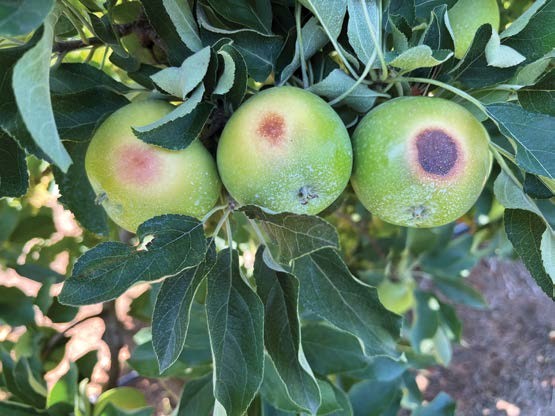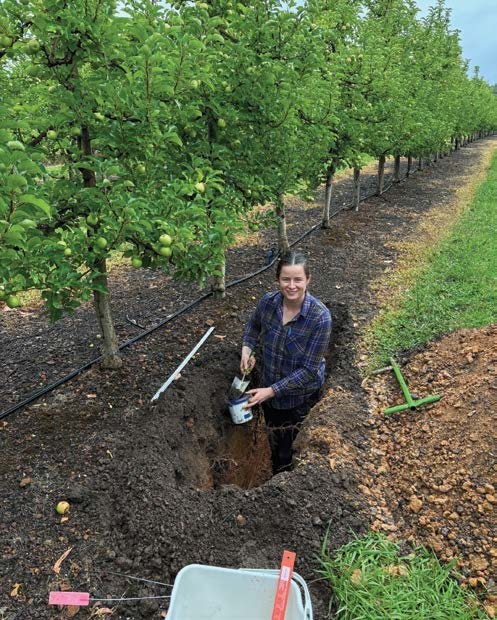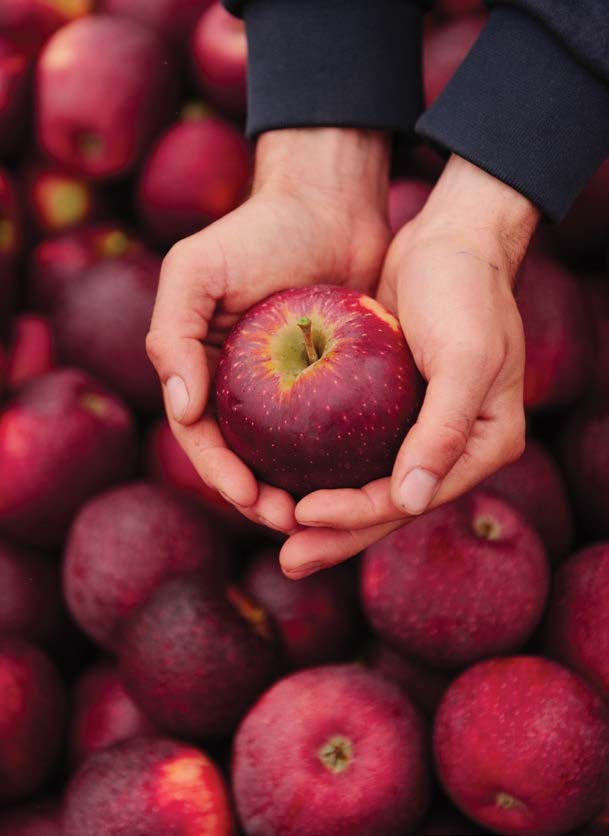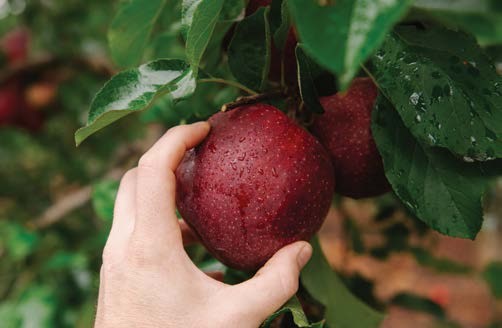update POMEWEST
HAPPY HARVEST 2025
A new year, new season, and new opportunities

On behalf of the Chair, Committee, and team at Pomewest, we are pleased to welcome Peter Spackman, the new CEO of vegetablesWA. We look forward to collaborating with you and again with the other Hort commodities in 2025 for the benefit of the WA horticultural industry and celebrate a new era of opportunities in fresh produce and its vital role in feeding our community and overseas neighbours.
Words Nardia Stacy, Executive Manager, Pomewest
THE pre-harvest period this season has been relatively calm on the orchards. Reports indicate a healthy apple crop, with no significant pest issues reported. Thinning processes have been completed, and the 2025 apple harvest has officially commenced in the Perth Hills. Australia Day now serves as the ceremonial start of the harvesting season.
In January and early February, WA again faced extreme temperatures exceeding 40°C in some areas, posing risks of sun damage to unprotected crops and an ongoing seasonal threat of cyclones in the northern regions. In these warm conditions, irrigation is vital for safeguarding crops, and the water supply is expected to remain resilient this year compared to 2024.
Looking ahead, our industry must develop strategies to mitigate the impact of heat events, which have disrupted supply and mainly affected pear cultivation in the Donnybrook area in recent years.
This idea has been incorporated as a new pillar of tactical goals for the upcoming WA pome fruit strategic plan for 2026–30. Fortunately, we have proactively collected data over many years, giving us a valuable tool to understand climate variations and their effects on quality. This information will assist us in achieving our objectives.

Granny’s sunbaking in Donnybrook.
Regarding quality, Pomewest has launched its apple maturity testing program, which assesses market-ready samples from the new season. Now in its eighth year, Pomewest offers various resources to help growers determine the optimal harvest time, ensuring that consumers enjoy the highest quality fruit. Western Australian pome growers actively participate in this program, positioning our industry to lead the country in enhancing consumption through high-quality, flavourful produce. This focus has not only resulted in improved pricing but has also fostered unity within the local industry. We commend our producers for their dedication to supplying quality local WA produce to the market, significantly supporting our efforts to drive excellence for consumers while also ensuring profitability and sustainability.
New research and development activities
In 2025, the projects, trials, and programs with localised PIPS4Profit, Narrow Orchard Systems, will continue in earnest, along with exciting new trial prospects.
The Pomewest team has secured external funding to undertake two APAL Future Orchards® Incubator Trials for 2025. Partnering with APAL and Hort Innovation’s Future Orchards, this regionally focused trial program addresses current and emerging issues, allowing growers to test new concepts and acquire skills. The first trial in WA examines the root cause behind a problem block with an uneven fruit maturity, while the second focuses on weed control methods. In autumn 2024, a Pink Lady® block displayed advanced fruit maturity at harvest due to suspected salinity stress or nutrient imbalance after unseasonably dry conditions. A root cause analysis is underway to identify reasons for the premature ripening. Apple trees are sensitive to salinity, which can lead to leaf toxicity from salt accumulation in the wood. Jen and Susie initiated the investigation by collecting soil samples. The study will thoroughly test soil, water, and leaf nutrients at various stages of the season. Findings will guide growers in addressing nutrient imbalances and enhancing soil conditions effectively.

Jen deep in the trenches, root cause analysis soil sampling.
The second trial investigates weed control methods in WA orchards. The possible removal of paraquat/diquat and potential restrictions on glyphosate and glufosinate could impact weed control practices in Australia. Pomewest plans to study WA Pome growers’ current weed management methods through a survey and phone interviews by Susie and Jen. The data collected will inform a field study comparing herbicides and mechanical and organic weed control options available to growers.
DPIRD has also announced an Apple Scab Research project designed to improve the productivity and profitability of apple orchards that may be affected by this severe disease.
Plus, our friends at the Fruitwest Cooperative are collaborating with Murdoch University on a new health-based project foro Bravo® apples.
Promotion and events

The Pomewest committee actively promotes local fruit awareness and consumer-focused events. We are joining the national levy-funded marketing campaign ‘No Snackgrets’ and ‘Australian Pears’ at all our events. We believe the key message is to emphasise natural food options and encourage individuals to swap processed snacks — such as chocolate, baked goods, salty snacks, and energy drinks — for healthier alternatives like apples.
This shift aims to increase consumer demand for fresh produce as snack options. The health benefits of this initiative are particularly relevant as discussions around weight loss drugs are emerging as a new approach to managing food intake.
The health sector surely must start to prioritise healthy food choices to meet the population’s nutritional needs and decrease the impact of the nutrition deficit on modern-day health costs.
We are starting the event season with the Donnybrook Apple Festival on Easter Saturday, April 19. This event provides an excellent opportunity to raise awareness about West Australian apples and pears.
Throughout the year, we will continue our schools program, participate in local events, and conclude our activities with our presence at the eight-day Perth Royal Show, celebrating all things apples! We aim to enhance our impact with increased engagement and promotions at these events for better outcomes for growers this year.
The WA Horticulture Update (WAHU) is also scheduled for October 21–22. Pomewest is involved in the organisational committee, working with DPIRD and other industries so please reach out if you have any presentations or topics you would like us to consider.
Finally, this year, our team will represent the WA pome industry through shared participation in various events, including evoke AG. Brisbane, Hort Connections Brisbane, South Africa Grower Excursion, and APAL technical forum. We plan to bring back the latest trends and research developments to our industry. This information will be shared through our newsletters, field days, grower presentations, and magazine articles throughout the year.
This edition
We are featuring a new research project investigating the connection between eating WA-bred Bravo® apples and heart health once and for all.
Hopefully, this project will be monumental, with evidence-based health conclusions to support this claim. Dario Stefanelli of DPIRD updates the Narrow Orchard Systems Project based in Manjimup and the new Apple Scab Project headed by DPIRD’s Dr Andrew Taylor. We also have an update by Daniel Pelliccia of Rubens Technologies on a new device that has been developed to support a new system of non-destructive and real-time assessment of quality and maturity for fruit.
In closing, on behalf of the Committee, Susie, Jen, and I are committed to advancing our collective efforts to improve the industry for 2025. Don’t hesitate to contact the Pomewest team if you need assistance or want to discuss industry-related matters with us. We will do our best to help.
